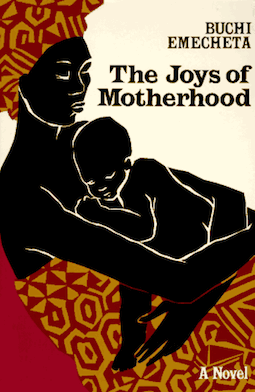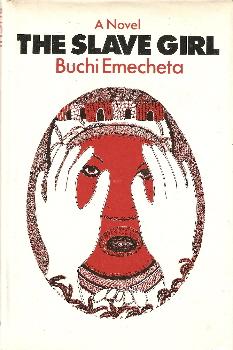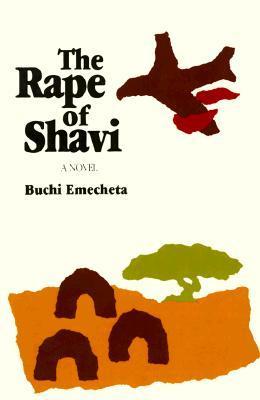
Florence Onyebuchi "Buchi" Emecheta was a Nigerian-born novelist, based in the UK from 1962, who also wrote plays and an autobiography, as well as works for children. She was the author of more than 20 books, including Second Class Citizen (1974), The Bride Price (1976), The Slave Girl (1977) and The Joys of Motherhood (1979). Most of her early novels were published by Allison and Busby, where her editor was Margaret Busby.

The Bride Price is a 1976 novel by Nigerian writer Buchi Emecheta. It concerns, in part, the problems of women in post-colonial Nigeria. The author dedicated this novel to her mother, Alice Ogbanje Emecheta.

The Joys of Motherhood is a novel written by Buchi Emecheta. It was first published in London, UK, by Allison & Busby in 1979 and was first published in Heinemann's African Writers Series in 1980 and reprinted in 1982, 2004, 2008. The basis of the novel is the "necessity for a woman to be fertile, and above all to give birth to sons". It tells the tragic story of Nnu-Ego, daughter of Nwokocha Agbadi and Ona, who had a bad fate with childbearing. This novel explores the life of a Nigerian woman, Nnu Ego. Nnu's life centres on her children and through them, she gains the respect of her community. Traditional tribal values and customs begin to shift with increasing colonial presence and influence, pushing Ego to challenge accepted notions of "mother", "wife", and "woman". Through Nnu Ego's journey, Emecheta forces her readers to consider the dilemmas associated with adopting new ideas and practices against the inclination to cleave to tradition. In this novel, Emecheta reveals and celebrates the pleasures derived from fulfilling responsibilities related to family matters in child-bearing, mothering, and nurturing activities among women. However, the author additionally highlights how the "joys of motherhood" also include anxiety, obligation, and pain.

Gwendolen a 1989 novel by Nigerian-born writer Buchi Emecheta, also known by its United States title The Family. It is her tenth novel.

Ifeoma Okoye is a Nigerian novelist. She has been referred to by fans as "the most important female novelist from Nigeria after Flora Nwapa and Buchi Emecheta," according to Oyekan Owomoyela. She was born in Anambra State in Eastern Region, Nigeria. She went to school at St. Monica's College in Ogbunike to receive a teaching certificate in 1959. She then graduated from the University of Nigeria in Nsukka to earn a Bachelor of Arts honours degree in English in 1977. She wrote novels including Behind the Clouds, children's novels and short stories, such as The Village Boy and Eme Goes to School.

Victor Ehikhamenor is a Nigerian visual artist, writer, and photographer known for his expansive works that engage with multinational cultural heritage and postcolonial socioeconomics of contemporary black lives. In 2017, he was selected to represent Nigeria at the Venice Biennale, the first time Nigeria would be represented in the event. His work has been described as representing "a symbol of resistance" to colonialism.

The Slave Girl is a 1977 novel by Nigerian writer Buchi Emecheta that was published in the UK by Allison and Busby and in the US by George Braziller. It won the Jock Campbell Award from the New Statesman in 1978. The novel was Emecheta's fourth book; it was dedicated to her editor Margaret Busby.

Second Class Citizen is a 1974 novel by Nigerian writer Buchi Emecheta, first published in London by Allison and Busby, where her editor was Margaret Busby. It was subsequently published in the US by George Braziller in 1975. A poignant story of a resourceful Nigerian woman Adah who was belittled by everyone.While growing up her parents especially her father did not really want to send her off to school he thinks a woman's education is going to end up in her husband's kitchen Unlike her junior brother boy who was sent to school at an early age, after an incident she was allowed to go to school well what did you know she was a bright student after all after her primary school education she then proceeded to go to her secondary school ,she graduated from her secondary school she got married without a ring but she loved her husband Francis dearly she thinks she's going to be treated well by her husband Francis. He did treat her right ,but as soon as they got to London he changed towards her and her children Adah being a strong woman did not rely on her husband she overcomes strict tribal domination of women and countless setbacks to achieve an independent life for herself and her children, the novel is often described as semi-autobiographical. The protagonist Adah's journey from Nigeria to London – where despite atrocious living conditions and a violent marriage, she "finds refuge in her dream of becoming a writer" – follows closely Emecheta's own trajectory as an author.
Chikwenye Okonjo Ogunyemi is a Nigerian academic, a literary critic and writer. She taught at Sarah Lawrence College and she is best known for her articles and books concerning the theory of Womanism and the African Diaspora.
Pauline Ada Uwakweh is a Nigerian writer and academic. Writing as Pauline Onwubiko, she published Running for Cover (1988), a children's novel giving a child's-eye view of the Nigerian civil war. She is a Professor of Literature in the English Department at North Carolina A&T State University. Her specialism is African writing and literature from the African diaspora, particularly women's writing.

Head above Water is a 1986 non-fiction book by Nigerian novelist Buchi Emecheta. It was published in 1986 in the African Writers Series by Heinemann and has been described as "anecdotal autobiography."

The Rape of Shavi is a 1983 fiction novel written by Nigerian novelist Buchi Emecheta. It was first published in 1983 by George Braziller.

Double Yoke is a 1982 novel written by Nigerian writer Buchi Emecheta. It was published in the United States on September 2, 1982, by George Braziller.
In the Ditch is a 1972 novel written by Nigerian writer Buchi Emecheta. It was first published on New Statesman as a regular column then published in 1972 by Allison & Busby in London, where her editor was Margaret Busby.
The New Tribe is a 2000 novel written by Nigerian writer Buchi Emecheta. It was first published by Allison & Busby, and republished by Heinemann as part of the African Writers Series.

The Son of the House is a family saga novel written by the Nigerian author Cheluchi Onyemelukwe. Her debut novel, it was first published by Parrésia Publishers and Penguin Random House South Africa in 2019.

Destination Biafra is a 1982 novel by Nigerian writer Buchi Emecheta, first published in London by Allison & Busby. It is considered to be Emecheta's personal account of the Biafra War. Destination Biafra was republished in paperback on 1 March 1994 by Heinemann Educational Books as part of the African Writers Series.

Naira Power is 1982 novel by Nigerian writer,Buchi Emecheta. It was published as part of the Pacesetter series of popular fiction published by Macmillan.
Florence Onyebuchi Orabueze is a poet, writer and a Nigerian professor of English and literary studies. She was a former director of the Institute of African studies of the institution, the founder of the Grace Uzoma Okonkwo Foundation and a member of Nigerian Academy of Letters.














